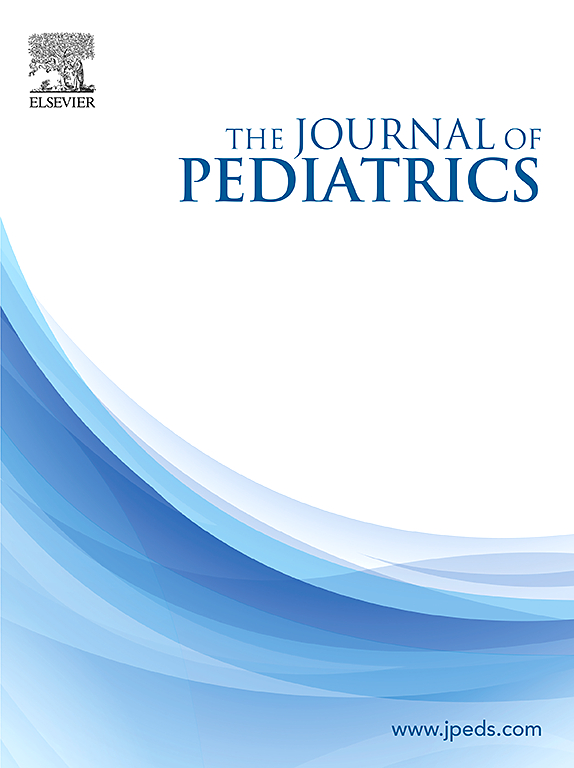晚期早产儿:分娩住院期间的管理。
IF 3.9
2区 医学
Q1 PEDIATRICS
引用次数: 0
摘要
研究目的研究设计:这项回顾性、单一机构、队列研究分析了 2019 年至 2021 年晚期早产儿的电子健康记录。不包括因畸形而必须入住新生儿重症监护室的婴儿。分析包括描述性和推论性统计:研究包括 1022 名婴儿:209 名(21%)34 周龄;263 名(26%)35 周龄;550 名(54%)36 周龄。63%怀孕 35 周的婴儿和 78% 怀孕 36 周的婴儿在出生住院期间一直接受新生儿护理;怀孕 34 周的婴儿没有资格接受新生儿护理。34周、35周和36周新生儿需要呼吸支持的比例分别为32%、18%和11%。体重 34 周、35 周和 36 周的婴儿中,分别有 55%、24% 和 8% 需要使用补充管喂养。大多数出生日期为 34 周的婴儿(91%)都被安置在保温箱中,而 35 周(37%)和 36 周(16%)的婴儿则较少出现这种情况。分别有 40%、61% 和 57% 的婴儿出现呼吸过速、低血糖和体温过低。这些婴儿中的一部分(30%呼吸过速、23%低血糖、46%低体温)需要对这些异常情况进行医疗干预:这项单中心研究为晚期早产儿的护理提供了一个前景。多中心研究可将这些发现与实际情况相结合,从而为这一庞大的婴儿群体制定临床基准和质量标准。本文章由计算机程序翻译,如有差异,请以英文原文为准。
Infants Born at Late Preterm Gestation: Management during the Birth Hospitalization
Objective
To examine the admission practices, frequency of common clinical morbidities, and rates of medical intervention in infants born at 34-36 weeks gestational age (GA, late preterm).
Study design
This retrospective, single institution, cohort study analyzed electronic health records of infants born late preterm from 2019 through 2021. Infants with known congenital anomalies necessitating neonatal intensive care unit admission were excluded. Analysis included descriptive and inferential statistics.
Results
The study included 1022 infants: 209 (21%) 34 weeks GA, 263 (26%) 35 weeks GA, and 550 (54%) 36 weeks GA. Sixty-three percent of infants at 35 weeks GA and 78% of infants of 36 weeks GA remained in well newborn care throughout the birth hospitalization; infants born at 34 weeks GA were ineligible for well newborn care. The need for respiratory support was 32%, 18%, and 11% in infants of 34, 35, and 36 weeks GA, respectively. Supplemental tube feeds were administered in 55%, 24%, and 8% of infants of 34, 35, and 36 weeks GA, respectively. Most infants born at 34 weeks GA (91%) were placed in an incubator; this was less frequent in infants at 35 (37%) and 36 weeks (16%). Tachypnea, hypoglycemia, and hypothermia were noted in 40%, 61%, and 57% of infants, respectively. A subset of these infants (30% with tachypnea, 23% with hypoglycemia, and 46% with hypothermia) required medical intervention for these abnormalities.
Conclusions
This single-center study provides an outlook on the care of infants born late preterm. Multicenter studies can contextualize these findings in order to develop clinical benchmarks and quality markers for this large population of infants.
求助全文
通过发布文献求助,成功后即可免费获取论文全文。
去求助
来源期刊

Journal of Pediatrics
医学-小儿科
CiteScore
6.00
自引率
2.00%
发文量
696
审稿时长
31 days
期刊介绍:
The Journal of Pediatrics is an international peer-reviewed journal that advances pediatric research and serves as a practical guide for pediatricians who manage health and diagnose and treat disorders in infants, children, and adolescents. The Journal publishes original work based on standards of excellence and expert review. The Journal seeks to publish high quality original articles that are immediately applicable to practice (basic science, translational research, evidence-based medicine), brief clinical and laboratory case reports, medical progress, expert commentary, grand rounds, insightful editorials, “classic” physical examinations, and novel insights into clinical and academic pediatric medicine related to every aspect of child health. Published monthly since 1932, The Journal of Pediatrics continues to promote the latest developments in pediatric medicine, child health, policy, and advocacy.
Topics covered in The Journal of Pediatrics include, but are not limited to:
General Pediatrics
Pediatric Subspecialties
Adolescent Medicine
Allergy and Immunology
Cardiology
Critical Care Medicine
Developmental-Behavioral Medicine
Endocrinology
Gastroenterology
Hematology-Oncology
Infectious Diseases
Neonatal-Perinatal Medicine
Nephrology
Neurology
Emergency Medicine
Pulmonology
Rheumatology
Genetics
Ethics
Health Service Research
Pediatric Hospitalist Medicine.
 求助内容:
求助内容: 应助结果提醒方式:
应助结果提醒方式:


